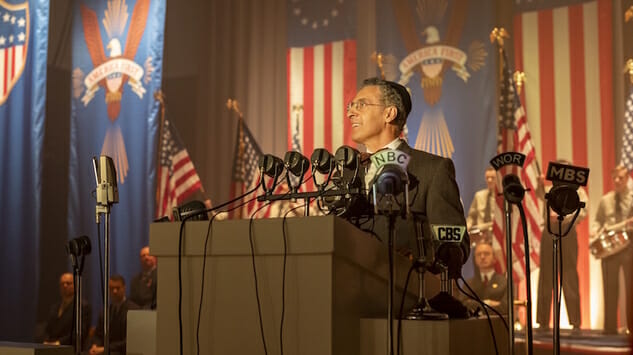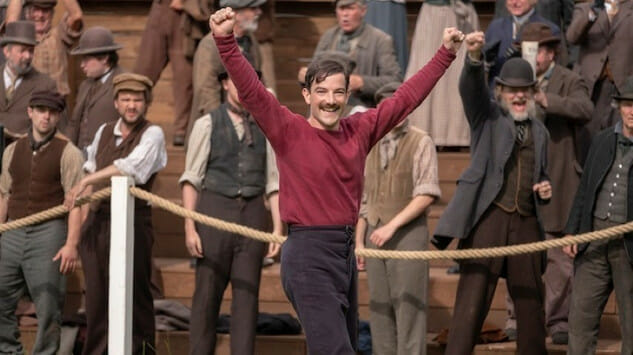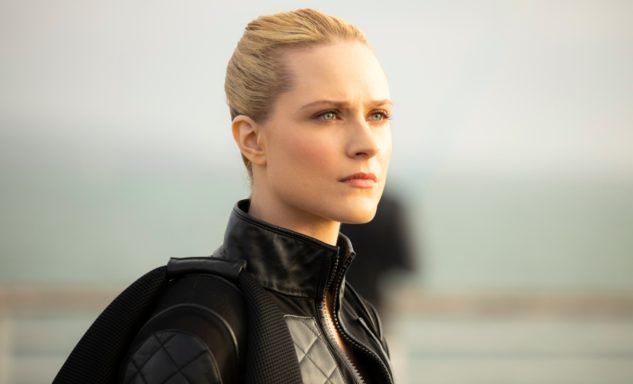Paste Power Rankings: The 10 Best Shows on TV Right Now, from Little Fires to The English Game
Illustration by Christine Fernando and Soleil Collins
Never has the cliché “the truth is stranger than fiction” been more true. The late-night hosts and our local news anchors are coming to us live from their living rooms. The daily press briefings from President Trump seem increasingly like a Saturday Night Live skit except with dire consequences. And Netflix is going full Netflix, with the debut of a completely bizarre true crime documentary. Thankfully TV still offers a much-needed escape from the debut of a stellar Hulu drama to the next project from the man behind Downton Abbey.
The rules for the Power Rankings are simple: Any series on TV qualifies, whether it’s a comedy, drama, news program, animated series, variety show or sports event. It can be on a network, basic cable, premium channel, Netflix, Amazon, Hulu, YouTube or whatever you can stream on your smart TV, as long as a new episode was made available the previous week—or, in the case of shows released all at once, it has to have been released within the previous four weeks.
The voting panel is composed of Paste Editors and TV writers with a pretty broad range of tastes. We’re merciless: a bad episode can knock you right off this list. So much good TV is available right now.
Honorable Mentions: Devs (FX), Miracle Workers: Dark Ages (TBS), This Is Us (NBC), Legacies (The CW), Tiger King (Netflix), Better Things (FX), Brooklyn Nine-Nine
10. Outlander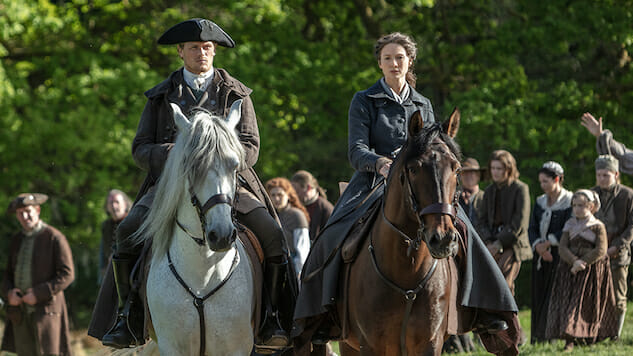
Network: Starz
Last Week’s Ranking: Not Ranked
As our own Keri Lumm said of Outlander’s new season, it feels like a warm hug of familiarity. But after kicking off with the joy of a wedding, Outlander soon movies into worthy and complicated considerations of living in the past while having modern knowledge—particularly of medicine that could help your family and community. As Claire (Caitriona Balfe) expands her medical practice, Jamie (Sam Heughan) must wrestle with promises he’s made to the Crown in order to keep his American land where his family has made a homestead, as revolution inches closer (with the Frasers at the center of it all, of course). But Outlander is at its best when it’s focusing on the personal stories (including one surprisingly horrific story detour that may also be one of the show’s most interesting) within these larger historical contexts, most especially the partnership and enduring romance between Jamie and Claire, which remains TV’s most loving and aspirational. —Allison Keene
9. Dispatches from Elsewhere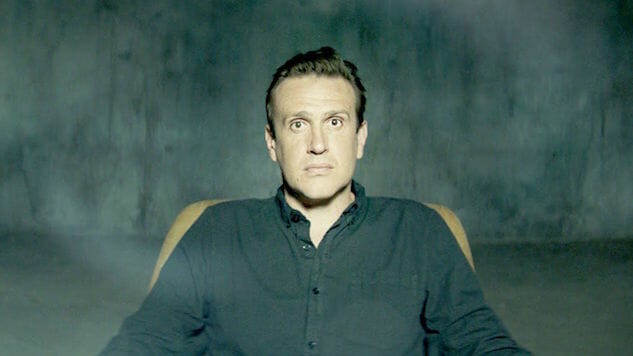
Network: AMC
Last Week’s Ranking: 10
Jason Segel’s charming new series is a puzzle box: four strangers band together to try and put together clues relating to two warring secret institutes. And yet, Dispatches from Elsewhere wraps all of that up into an optimistic and charming exploration of selfhood. Like a kind of Amélie-by-way-of-Philadelphia, its central characters (played by Segel, Andre Benjamin, Sally Field, and Eve Lindley) wander the city through warm, candy-colored hidden rooms divining cryptic patterns and uncovering unexpected vistas they never knew existed—both within the visual landscape and inside their very souls. It has quite a bit in common with the late, great Lodge 49, as our heroes step outside their comfort zones to try and unpack what it all means (and what “it” even is) in sweet, earnest ways. —Allison Keene
8. Legends of Tomorrow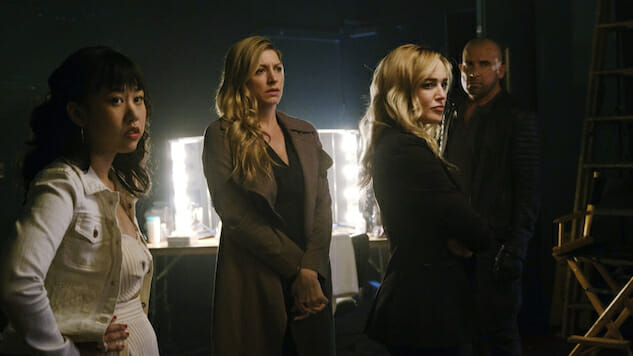
Network: The CW
Last Week’s Ranking: 7
For those weary of the Arrowverse or of superhero shows in general, Legends of Tomorrow remains an intoxicating breath of fresh air. The series began by assembling a ragtag crew of characters from elsewhere in the CW’s superhero universe, and while it was always a bonkers good time, it has grown into a series that continues—even into its fifth season—to surprise and delight as one of TV’s smartest. Filled with meta humor and history-tinged hilarity as our crew of sundries travel through time to stop demons, hellspawn, magical creatures, and other power-hungry baddies from altering the past, the series will often gut-punch you with incredible emotional storylines and reveals that illustrate how wonderfully deep it all really is. The writers and actors are all clearly having a good time, and viewers can’t help but mirror that positivity and excitement. As a show that is never afraid to mix things up, cut things that aren’t working, change up entire narratives, or replace old characters as alt-timeline versions of themselves, Legends of Tomorrow continues to reinvent itself and only get better as it goes. One of TV’s best kept secrets, it’s also one you really cannot miss. (You can catch up on previous seasons on Netflix, and use this guide to figure out where to start). —Allison Keene
7. Star Trek: Picard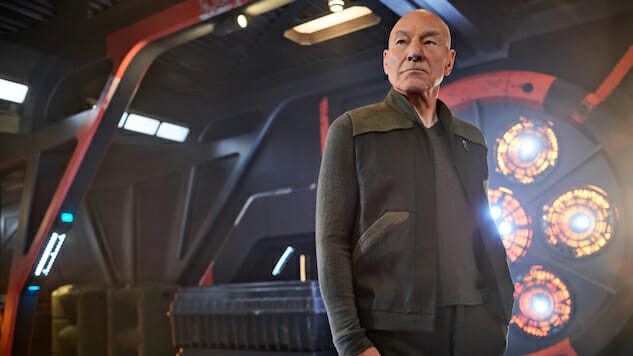
Network: CBS All Access
Last Week’s Ranking: 4
The most important thing to know about Star Trek: Picard is that while bringing back one of the franchise’s most iconic characters might seem like a deliberate retreat to the past, the CBS All Access series is much more about the new: New characters, new mysteries, and a whole new era of the Trek universe to explore.
Set in the year 2399, almost 30 years after the end of Next Generation, Jean-Luc Picard (Patrick Stewart) has lost faith in the organization to which he had devoted his life. The show begins with him in retirement/retreat at the Chateau Picard vineyard in France, spending his days puttering around the vines with his trusty pitbull Number One, and his nights dreaming of lost friends and better times.
However, the arrival of Dahj (Isa Briones), a terrified young woman who seems to know him without knowing why, pulls him out of his self-imposed exile. To go into further detail about what happens would be to spoil the show’s biggest twists. This is not an adventure-of-the-week story, but instead a mystery that only gets more complex episode by episode. And while that mystery is deeply grounded in the show’s history, it is fresh and new enough to make Trek newcomers feel somewhat welcome.
Picard isn’t above moments of nostalgia but it also features a firm commitment to moving the franchise forward not just in time, but in what kind of stories Trek is capable of telling. This is a show that is more complicated and mature than what came before, but in the best ways, ways which do not discredit the past, but show it’s always possible to change and grow—whether you’re a 79-year-old man, or a 54-year-old franchise.—Liz Shannon Miller
6. Zoey’s Extraordinary Playlist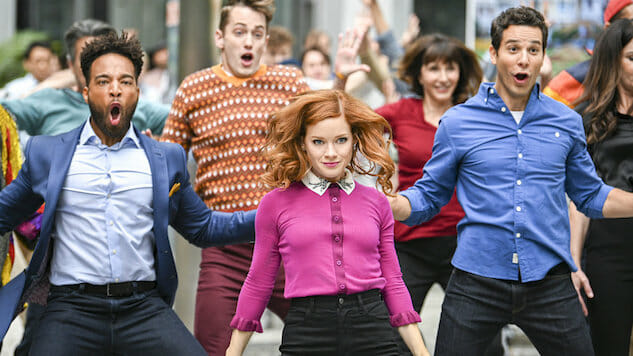
Network: NBC
Last Week’s Ranking: 9
Look there’s no denying that 2019 was a tough year (and 2020, having missed the memo it was supposed to be better, is even tougher). And when I look back on some of my favorite TV shows of 2019—Unbelievable, Fleabag, Russian Doll, Evil—they aren’t exactly brimming with joy. Perhaps it was an extension of the pathetic fallacy where TV, not nature, is reflecting human emotions. That’s why I’m so delighted to tell you that Zoey’s Extraordinary Playlist on NBC is a pure delight. It is a show that is 1000% guaranteed to put a smile on your face, get your feet tapping and leave you humming a happy tune. I defy you to not be in a good mood after watching it.
The show skews towards people who love musicals and big Broadway-style production numbers (guilty as charged). Jane Levy stars as the titular character who, after an MRI gone awry, can suddenly hear the soundtrack of people’s lives; their innermost thoughts set to a Beatles song, a Whitney Houston ballad or a Katy Perry number.
It’s NBC taking a risk. As far as musical TV series go, for every Glee or Crazy Ex-Girlfriend there’s a Cop Rock. But for network television to be airing, promoting, financing a show like this is a sign that broadcast TV isn’t throwing in the towel to Netflix, Hulu, Amazon or (heaven help us) Quibi. NBC has come to play, thank you very much. And that is something to sing about. —Amy Amatangelo
5. The Plot Against America
Network: HBO
Last Week’s Ranking: Not Eligible
Alt-history, like regular history, always serves as a lesson for the present. Even when the “alt” is doing more work than the “history” (see Abraham Lincoln: Vampire Hunter), the fictionalized what-ifs of the world deserve their own place in historiography, simply because they reflect what events and fears people connected to throughout time—and why. In The Plot Against America, the miniseries adaptation of Philip Roth’s novel from David Simon and Ed Burns, these fears come to life when Franklin D. Roosevelt loses his 1940 reelection to Charles Lindbergh (Ben Cole), whose real-life isolationist activities with the America First Committee, antisemitism, and public fame draw startling contemporary comparisons. It’s a deft period piece, a quick-paced drama, and a provoking parallel to the current U.S. administration with all its demagoguery and bluster.
But it’s not Lindbergh’s story, just like it’s not Donald Trump’s. It’s the story of how the Newark couple Herman (Morgan Spector) and Bess Levin (Zoe Kazan) and their household—including their kids, Phillip (Azhy Robertson), and Sandy (Caleb Malis)—are affected by a nation that only needed a nudge to turn against them. That’s where The Plot Against America draws its big hard-realist line in the sand between itself and other Nazi-American fiction like The Man in the High Castle, with which it shares imagery. This isn’t fantastic. This isn’t science-fiction. There, but for the grace of Roosevelt, go we.
The Plot Against America drives its Packard 180 right up my alley. It shares a lot of what I appreciated about Simon’s other recent HBO series The Deuce: beautiful urban and suburban cinematography that lends itself to showing different communities and how they overlap, tight conversations realistically scripted, and shifting public opinion at a pivotal time in America. And of course, uncomfortable as it is, it’s all immaculately crafted. The Plot Against America is another crash course in history, sociology, and political science from The Wire team that has all the power of a waking nightmare.—Jacob Oller
4. The English Game
Network: Netflix
Last Week’s Ranking: Not Eligible
The English Game arrives at a good time for two reasons. One, the 21st century has really been lacking in great sports movies that so dominated the 1980s and ‘90s. Two, sports are cancelled right now because of the spread of coronavirus. So why not settle in and watch some pale but fit English lads run around the pitch in what is essentially Chariots of Fire: The Series?
Taking place in the 1870s, the six-part miniseries (from Downton Abbey’s Julian Fellowes) introduces us to the true story of two players from opposing sides who will change the game in critical ways. The first, brashly handsome Arthur Kinnaird (Edward Holcroft ), has dominated the field for years playing for the Old Etonians—whose team has not only won four FA (Football Association) cups at this point, but who also double as FA board members and chairman. (You see the problems already). The second, Fergus Suter (Kevin Guthrie ), is a wee Scottish powerhouse who has been brought to play for Darwen FC, a northern mill-town club, before being wooed by Blackburn.
The larger question that The English Game tackles (pun partially intended) is one of inclusion. Who is this game for? It was crafted by wealthy Englishmen, but are they the future of it? We know they answer is “no,” but it’s something in the 1870s that was only just beginning to become clear. Fergus and Love—two of the best players in the game—are Scottish and working class. This is already revolutionary. But their play style is also evolving from the one the Old Etonians employ. Fergus encourages his teammates to move out farther and pass more, something we’ve seen Spanish players in just the last decade take to an exceptional art form.
The short run and miniseries format (one that is a true miniseries, with a very clear end) make The English Game an easy investment, and one that everyone can enjoy while under quarantine orders or beyond. But it’s also a story whose questions are still very relevant today (regarding hooliganism, playing for money versus pride, the role of amateur clubs). Its answers are, too. Who is the game for? That is clear enough: Anyone who loves it. When speaking of the growing numbers of supporters in the stands or those anxiously sitting at pubs waiting for scores, characters note again and again that it “gives them hope and pride and so much more.” And that’s what makes it not just The English Game, but the beautiful one.—Allison Keene
Network: HBO
Last Week’s Ranking: 2
The Hosts have left the murder-happy amusement park of carnal sin to give humanity a taste of its own medicine in Season 3 of HBO’s Westworld, where the mythical conflict of creator and creation continues to follow its tragic and violent course. Revolts against a progenitor pantheon—for example, in the Greek War of the Titans—rarely result in fuzzy feel-good fun for the victors (or those over which they rule), but like most things in the labyrinthine sci-fi, it’s the flavor rather than the fact that makes the show fun. While its ambitions have certainly changed since its first screenshot-able season encouraged fans to play Where’s Waldo in the forums, Westworld is still a good time with its looming war on the horizon—and it’s even halfway comprehensible this time around. Don’t worry! There’s still plenty to be confused about. Westworld is 100% back on its bullshit and, depending on how much you like your TV to be a rug-yanking crash course in skepticism, still presents beautiful illusion after beautiful illusion for you to doubt. Westworld at its most narratively accessible and visually unambitious. Season 3 may have expanded its story to a worldwide class conflict, but it still feels like its scope scaled down for the better as it hurdles towards a conclusion perhaps tragically predestined to reverse the power dynamics of the original park.—Jacob Oller
2. Better Call Saul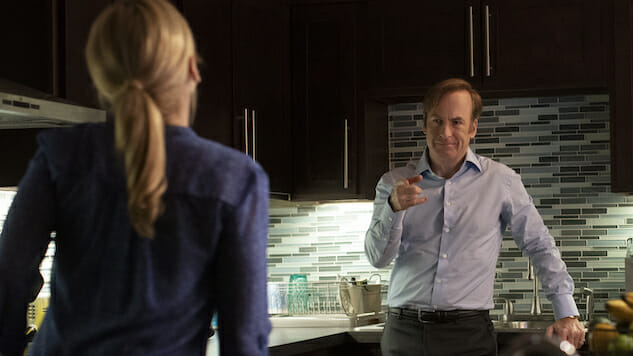
Network: AMC
Last Week’s Ranking: 3
It was only recently announced that Better Call Saul would be ending with its sixth season, though it wasn’t necessarily shocking news, given that with each passing year it’s been harder for one of TV’s best shows to ignore the future it’s been creeping towards. Season 5 is smart about how it acknowledges that, specifically in regard to increasing the Breaking Bad prequel’s engagement with what came canonically before but narratively after.
The final 13-episode season will mean that Saul will have run for 63 episodes, one more than Breaking Bad. Like everything else about this show, that was a deliberate choice. That said, Season 5 of Saul doesn’t necessarily feel like the beginning of the end. Instead, it’s more like the end of the beginning, given that after the events of the Season 4 finale, Jimmy McGill has now officially embraced the Saul Goodman identity—legally and professionally, at least.
Saul is the first persona we ever saw Bob Odenkirk wear in this universe, but thanks to the four seasons that have come before, we recognize it for the mask that it is. However, Jimmy seems to be getting more comfortable with wearing it, especially when this season pushes him to make some choices that prove reminiscent of his original introduction: In the words of Jesse Pinkman, “You don’t want a criminal lawyer… you want a ‘criminal’ lawyer.”
But Better Call Saul is a show whose fundamental foundation is built on the idea that every action has consequences, seen or unseen. In comparison to The Good Place, a show all about ethical debate, Better Call Saul isn’t searching for answers: The characters might debate ideas of moral relativism, but the sure and steady hand of creators Peter Gould and Vince Gilligan knows what is right and what is wrong—and it is never afraid to reveal what can happen when that line gets crossed. —Liz Shannon Miller
1. Little Fires Everywhere
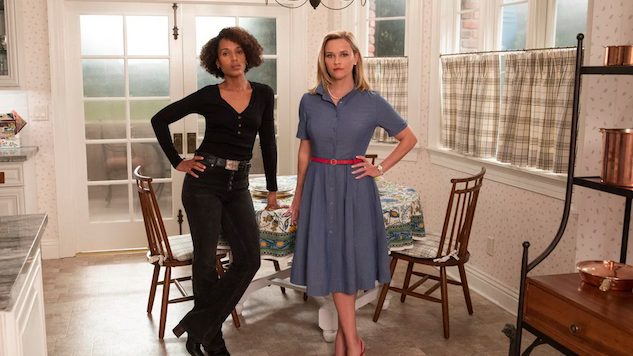
Network: Hulu
Last Week’s Ranking: Not Eligible
“You didn’t make good choices. You had good choices! Options that being rich and white and entitled gave you.”
That’s Mia (Kerry Washington) screaming to Elena (Reese Witherspoon) during the emotionally charged fourth episode of the new Hulu series Little Fires Everywhere.
The line sums up the crux of a series that explores the complicated themes of race, wealth, and motherhood with a delicate aplomb. Based on the Celeste Ng’s 2017 novel of the same name, the eight-episode series follows the sequence of events that occur when Mia moves to the storied community of Shaker Heights, Ohio with her teenage daughter Pearl (Lexi Underwood) in 1997.
Elena’s friend Linda (Rosemarie DeWitt) has struggled with infertility for years and has finally adopted a baby with her husband Mark (Geoff Stults). Their lives have been wrecked by miscarriages and still births. Their adopted daughter Mirabelle is the answer to years of prayer and heartache. Meanwhile, Mia’s co-worker Bebe (Huang Lu) decides to fight for custody of the baby she abandoned. The mother-focused stories continue, and eventually come to a boil: these proverbial “little fires everywhere” become harder and harder to extinguish as the series progresses.
The series is set in the 1990s but its themes, particularly those surrounding what defines motherhood, are timeless. The conversation around race and privilege are perhaps even more relevant today than the era in which the show is set.
Washington is fantastic as Mia. Her hard, angry exterior barely conceals her vulnerability. She’s a fiercely protective mother who may not always make the best choices but always wants what is right. Witherspoon has perfected the entitled character who is blind to her own entitlement, living a life that is so controlled and carefully cultivated that she may have even lost sight of what she truly wants in life. Together, these elements ignite to form a show well worth watching.—Amy Amatangelo
For all the latest TV news, reviews, lists and features, follow @Paste_TV.
